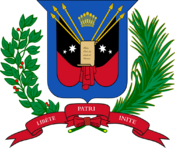Council of State (Carucere)
| National Council of Carucere | |
|---|---|
| Nasyonal Konsey Karuke | |
 Coat of Arms of Carucere | |
The 2023 National Council
| |
| Government of Carucere | |
| Style | His/Her Excellency |
| Status | Head of government |
| Appointer | Direct election President of Carucere Senate |
| Term length | Four years, no term limit |
| Inaugural holder | |
| Formation | 1972 |
The National Council of Carucere (Papotement: Nasyonal Konsey Karuke), is an executive body which serves as the collective de jure head of government of Carucere. While the President of Carucere is the leading political figure within the National Council as de facto head of state, it is the Council as a whole that serves as the highest executive authority in Carucere.
The National Council currently consists of five members; the President of Carucere and four delegates nominated by the President and approved by a two-thirds majority vote in the Senate. The National Council formally exercises executive power in Carucere, such as the authority to formulate policies and draft measures. The Council oversees the administration of the country through its supervision of the Cabinet of Carucere, which consists of the heads of goverment ministries. Although the President is the permanent presiding officer of the Council, they are primus inter pares within the Council which operates through consensus decision-making.
Current members
Role
Carucere has a de-facto fusion of a presidential and a collegiate system. While the President decides the direction and priorities of the Government as the permanent presiding officer, ultimately executive power is collectively wielded by the Council. While the President can wield some political influence as de facto head of state, ultimately their de facto power relies on a supportive National Council, and is not directly attributed to the post of president. Traditionally the Council operates "above" ethnic partisanism, representing the entire country instead.
The Council's greatest power is their ability to appoint Preimers and the members of the Cabinet. However, since the Senate must approve new appointments by a majority vote, the deputies named by the Council must be supported by the Senate, or the candidate will be denied. The National Council has the discretionary power to dissolve the Senate when they see fit, such as when the National Council is unable to govern due to the Senate's disapproval. The Council must promulgate all laws enacted by the Senate or the Government for them to come into force. However the President has the authority to veto laws, although the Senate can override this by a two-thirds majority vote. The president may also refer the law for review by the Constitutional Council if the Council votes to doubt its constitutionality. The National Council also has legislative initiative by enacting decrees with the full force of law and by submitting legislation to the Senate.
Operation
Powers & Duties
To perform their duties, the National Council are given the powers:
- to promulgate laws. The Council lacks a formal veto power but may refer the law for review by the Constitutional Council if the National Council doubts its constitutionality. However if the court approves, the National Council must approve the bill.
- to declare war.
- to hold a referendum regarding issues of national importance.
- to issue decrees with the full force of legislation. However decrees can be overridden if the Senate passes conflicting legislation.
- to submit legislation to the Senate.
- to issue medals and honors for serving the nation.
- to issue pardons.
- to declare a state of emergency suspending all laws or enacting a state of martial law.
- to regulate and join treaties, alliances, and other agreements coming from foreign states according to the Constitution.
- to appoint the Premier and other members of the Cabinet.
- to appoint senior public officials.